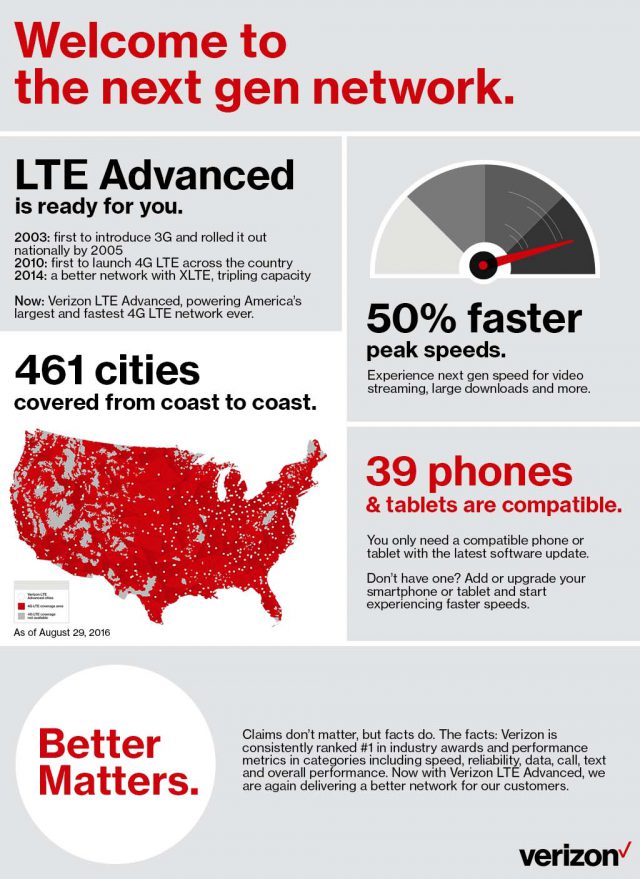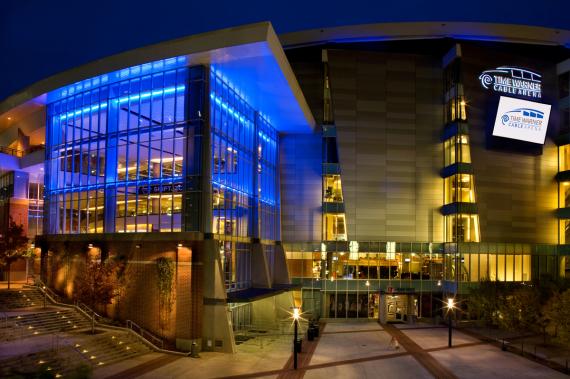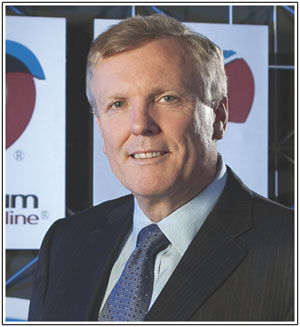 Verizon Wireless today launched LTE Advanced technology to bring up to 50% faster peak wireless data speeds to almost its entire national 4G LTE service area.
Verizon Wireless today launched LTE Advanced technology to bring up to 50% faster peak wireless data speeds to almost its entire national 4G LTE service area.
LTE-A allows Verizon to better balance its data traffic by combining disparate mobile data channels on different frequency bands to increase bandwidth and speed for mobile data traffic. The technology, known as carrier aggregation, helps mobile providers more efficiently deliver data over multiple frequency bands at the same time. Verizon controls space in the 700 MHz, AWS and PCS spectrum bands giving the company the possibility of combining two or three bandwidth channels together into a single channel, boosting speeds.
There is a catch. Only customers with the latest devices supporting LTE-A will experience dramatic speed boosts. Verizon currently supports 39 LTE Advanced-capable phones and tablets on its network, including the latest Samsung Galaxy and Apple iPhone models. If you own one of these devices, the speed improvements are automatic and no plan change is required.

Verizon’s original LTE network was shown to deliver more than 100Mbps in peak speeds when it was in the lab or during early beta tests. But once actual customers got on the network, speeds began to slow. Most customers today get LTE speeds of 5-12Mbps from Verizon Wireless. Verizon’s press release touts “peak download speeds of up to 225Mbps” using two channel aggregation and over 300Mbps when testing three channel aggregation. But customers may find speeds considerably slower than that as the number of LTE-A capable devices grows in the months and years ahead.
Verizon Wireless is not shy about its boasts for better wireless speed.
“Our customers just received a major network enhancement for no additional cost,” said Tami Erwin, head of operations for Verizon’s wireless unit. “Verizon LTE Advanced works like a turbocharger on an engine. Speed boosts kick in when you need it most, with big data use. That’s when you get the big peak boost of Verizon LTE Advanced.”
“Verizon LTE Advanced means your data session moves more quickly over the best network,” said Nicki Palmer, Verizon’s chief wireless network engineer. “Imagine a road with multiple lanes in which, once you pick a lane, that’s the lane you drive in. That describes our award-winning 4G LTE network. Continuing the metaphor, Verizon LTE Advanced allows cars to change lanes efficiently and flawlessly, balancing the flow of traffic and getting drivers to their destinations more efficiently. That means blindingly fast data transmissions when you need it most.”


 Subscribe
Subscribe A Los Angeles man has reached the boiling point after two years of telemarketing calls from Charter Communications that turn out to be the result of a wrong number.
A Los Angeles man has reached the boiling point after two years of telemarketing calls from Charter Communications that turn out to be the result of a wrong number. 2013: “I have never been more harassed by spam telemarketing/calling in my life than from Charter Communications and they already have my business! It’s
2013: “I have never been more harassed by spam telemarketing/calling in my life than from Charter Communications and they already have my business! It’s  Time Warner Cable Arena is no more.
Time Warner Cable Arena is no more.


 Charter Communications is promising its Southern California customers it won’t bungle the transition from Time Warner Cable to Charter Communications like Frontier Communications
Charter Communications is promising its Southern California customers it won’t bungle the transition from Time Warner Cable to Charter Communications like Frontier Communications  But not all customers are happy about Charter’s slow transition plans. Customers waiting for Time Warner Cable Maxx upgrades, some already in progress, may be out of luck. Charter’s new management team put an indefinite hold on Time Warner’s more aggressive upgrade plans in favor of Charter’s much more modest commitment to offer customers two broadband speed tiers – 60 and 100Mbps over the next 18 months. Customers in the northeast and midwest have been told there are no longer any definitive dates for the introduction of Maxx, which offers free speed upgrades up to 300Mbps.
But not all customers are happy about Charter’s slow transition plans. Customers waiting for Time Warner Cable Maxx upgrades, some already in progress, may be out of luck. Charter’s new management team put an indefinite hold on Time Warner’s more aggressive upgrade plans in favor of Charter’s much more modest commitment to offer customers two broadband speed tiers – 60 and 100Mbps over the next 18 months. Customers in the northeast and midwest have been told there are no longer any definitive dates for the introduction of Maxx, which offers free speed upgrades up to 300Mbps.